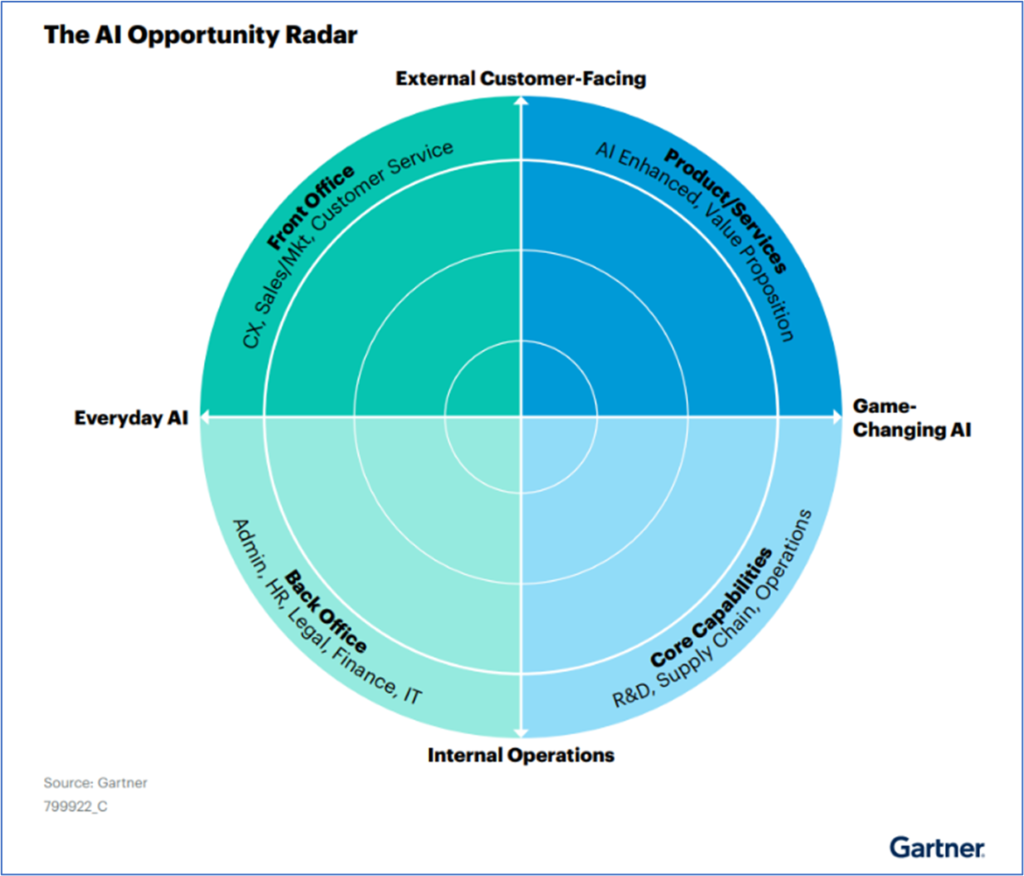AI a Big Shift in Human – Machine Interaction

The Gartner IT Symposium/Xpo 2023 gave a clarion call for IT leaders to embrace and lead the AI revolution within their organisations
The Gartner IT Symposium/Xpo 2023 began with some startling forecasts:
- By 2025, generative AI will be a workforce partner for 90% of companies globally.
- By 2030, 80% of humans will engage with smart robots on a daily basis.
- By 2028, more than 50% of enterprises that have built their own large language models (LLMs) from scratch will abandon their efforts due to costs, complexity and technical debt.
- AI, in general, will soon infuse everything we do.
- It will transform our jobs and our organisations.
- AI is not just a technology or a business trend. It is a profound shift in how humans and machines interact.
The symposium gave a clarion call for IT leaders to embrace and lead the AI revolution within their organisations. It highlighted the need for strategic planning, ethical considerations, and a deep understanding of emerging technologies. As AI continues to evolve, it will redefine the IT landscape – offering new challenges and opportunities for innovation and growth.
The symposium underscored the profound significant of artificial intelligence transforming the human-machine relationship. Moreover, generative AI has sparked massive disruption that poses opportunities and threats to every organisation. CIOs would need to perform a critical role in determining what role AI will play in the organisation. Technology decisions, especially those associated with AI, come with ethical, social and financial implications. Treating any of these domains in isolation increases risk. Executive teams, and especially CEOs, expect CIOs to lead AI efforts. They expect the CIO to safely harness the benefits of AI while mitigating its dark side.
Central Theme: Generative AI and Its Impact
The event focussed on Generative AI and its impact as its central theme and highlighted the following:
- Understanding Generative AI:
- Definition and Scope: Generative AI, as discussed in the keynote, refers to AI systems that can generate new content, ideas, or solutions based on learned data. This technology is not just an advancement but a revolution in AI capabilities.
- Strategic Importance: The symposium emphasised the strategic role of generative AI in businesses. IT leaders are encouraged to understand and leverage this technology to drive innovation and maintain competitive advantage.

Image: AI Opportunity Radar; Source: Gartner
- Tool for Navigating AI: This tool was highlighted as a critical resource for IT leaders. It aids in identifying and capitalising on AI opportunities relevant to their specific organisational contexts.
- Role in Strategic Planning: The radar is designed to help integrate AI into broader business strategies, ensuring alignment with organisational goals and values.
AI Strategy: A Core Leadership Responsibility
- Establishing AI-Ready Frameworks:
- Security and Data: A significant part of the discussion revolved around establishing robust AI-ready security protocols and data management systems. This is crucial for protecting sensitive information and ensuring ethical AI use.
- Principles and Ethics: The symposium underscored the importance of developing a set of principles guiding AI use, focusing on ethical considerations and societal impact.
- Leadership in AI Integration:
- Role of IT Leaders: IT leaders are seen as pivotal in guiding their organisations through the AI integration process. Their role involves not just technical implementation but also addressing the cultural and ethical dimensions of AI adoption.
Emerging Technologies and the Hype Cycle
- Key Technologies to Watch:
- Emergent AI: This refers to AI systems that evolve and improve autonomously, representing a significant leap in AI capabilities.
- Developer Experience (DevX): Enhancing the experience of developers in creating and managing AI and other software systems.
- Pervasive Cloud: The expansion of Cloud computing into more aspects of technology and business operations.
- Human-Centric Security: A shift in security focus to more human-cantered approaches, considering user behaviour and experience.
- Implications for Business and IT:
These technologies are expected to redefine business models, operational processes, and the overall IT landscape. They present opportunities for innovation, efficiency, and enhanced customer experiences.
The Evolving Human-Machine Relationship
- Collaboration and Enhancement:
The symposium highlighted the increasingly collaborative nature of the human-machine relationship. AI is seen as an enhancer of human capabilities rather than a replacement. Examples: AI in decision-making, creative processes, and problem-solving.
- Ethical and Societal Considerations:
With AI becoming more integrated into daily operations, ethical considerations, such as bias and privacy, are increasingly important. The symposium called for a balanced approach to AI integration, considering both technological benefits and societal impacts.
It is imperative for everyone to realise that Generative AI has made machines conversational, and they are quickly moving from being our tools to becoming our teammates. Machines are no longer limited to tasks like crunching numbers and providing information. With generative AI capabilities, machines can also be our consultants, protectors, coaches, friends, therapists, bosses or customers. Machines are going from what they can DO for us to what they can BE for us. This is a big shift that comes with a potential dark side, as machines can also be job killers, bullies, liars, thieves and spies!


